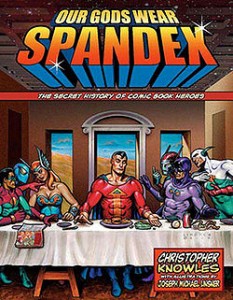 Patheos is a website that presents information on a variety of religious traditions. Over the course of the summer months the site has been looking at what the future holds for these religions, and in a recent focus on Paganism an essay was included that dovetails with the focus of TheoFantastique.
Patheos is a website that presents information on a variety of religious traditions. Over the course of the summer months the site has been looking at what the future holds for these religions, and in a recent focus on Paganism an essay was included that dovetails with the focus of TheoFantastique.
Christopher Knowles wrote a piece titled “Gods and Geeks in the Endless American Twilight.” It begins with a consideration of the popularity of conventions like Dragon*Con as part of what he labels our “rapidly-expanding Geek Nation.” Knowles notes that this convention includes not only Dungeon & Dragons fans, but also a number of tracks devoted to various facets of the fantastic in pop culture, from Star Wars and Star Trek to Doctor Who and Battlestar Galactica. Knowles then considers why this convention, and others like it such as Comic-Con, are so popular.
Knowles suggests that our present cultural miseries fuel our desire to find the divine in fantasy realms, and many times we need look no further than comic books, and the pop culture phenomena they inspire, in order to find these deities. In his book Our Gods Wear Spandex: The Secret History of Comic Book Heroes (Weiser Books, 2007), Knowles set forth a case for this which he echoes in the Patheos article: “superheroes are not so much like the heroes of the ancient world as they are like the gods — the savior gods, to be precise.” In his thinking, our movie and television screens portray “a new generation of gods..”.
Knowles also provides thoughts on “geek” culture, and in one of his more interesting insights on this subculture, he suggests that journalists make the mistake of assuming that this is composed primarily of “male, pale, sweaty, akward, antisocial” individuals. Instead, the late 1960s and early 1970s signaled a shift in both the quality of the fantastic in pop culture, as well as the demographics of those who consumed it, moving it beyond a 1950s paradigm which became the stereotype.
In one final observation about this essay, I found it interesting that Knowles sees Avatar as definitive in the context of an easily accessible fantasy. The film’s main character, Jake Sully, is seen as “a Superman in reverse” who comes to suffer with us, just “like the ancient gods of the Mysteries,” says Knowles. Of course Christianity has also presented a suffering god to humanity, and it is interesting to see “New Age,” ancient pagan, Western esotericism, and Christianity providing imaginative fodder for comics and the broader realm of the fantastic in pop culture.
Those interested in learning more about Knowles’s book on comics and their surprising religious sources of inspiration in esoterica can read the Preface to the book here, and the book can be ordered through the TheoFantastique Store here.
Related posts:
“Stan Lee, Comic Fairytales, and Spirituality”
“B.J. Oropeza: Comics, Archetypes, and Superheroes”
“And the Geeks Shall Inherit the Earth, or At Least Lead Pop Culture”





There are no responses yet